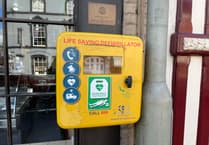DEVON County Council is being quizzed by opposition leaders on a decision to lend £5 million to debt-ridden Woking Council earlier this year.
The loan was made in March, a month after Woking issued a statement saying it was in “Section 114 territory” because of extraordinary levels of debt.
A Section 114 notice indicates the council does not have enough money coming in to meet its expenditure, and puts a ban on new spending.
Following a Freedom Of Information request, according to the Local Government Chronicle the Conservative led Devon County Council was one of four local and combined authorities that loaned money to Woking after its financial situation was revealed.
In June, the Liberal Democrat-run council declared itself effectively “bankrupt” after facing a deficit of £1.2 billion.
Last week Devon County Council said the loan was made “well before the full extent of Woking’s financial difficulties became clear” and is confident it will be repaid in full.
Opposition leaders said they were not aware of the loan until now and called the move “extraordinary and incredibly risky”.
Leader of the Independent and Green Group Frank Biederman (Fremington Rural) said: “If we have that sort of money knocking around, we would be better putting it into vital local services.
“We are consulting on closing mental health drop in centres in North Devon and day centres for the elderly, have taken the decision to close the mobile library service, have failing roads and a massive debt in the special educational needs and disabilities (SEND) budget, yet we have the money to loan £5 million to a failing council 150 miles away.
“This is Devon residents’ money and we need to know if and when we will get it back.”
Cllr Biederman has submitted questions and has asked for a cabinet report on the matter.
Liberal Democrat leader Cllr Julian Brazil (Kingsbridge) said: “I am shocked. “It begs the question: who is taking these decisions and should elected members be involved.
“Everybody knew Woking was a disaster. I find it extraordinary that we would loan to a council that was basically bankrupt. It’s incredible risky.”
A spokesperson from Devon County Council said in order to make its money work as hard as possible, Devon – like other large councils – occasionally loaned money to other authorities.
“We earn interest on the loan which helps fund our own services. This is common and normal practice.
“We loaned the money to Woking Borough Council in March, well before the full extent of its financial difficulties became clear, and all the correct governance procedures were followed.
“Based on the experience of other local authorities that have loaned to lower tier councils that are struggling, we are confident that our loan to Woking Borough Council will be repaid in full.
“No local authority has ever defaulted on the repayment of a loan from another council.”
Woking’s position is said to be partly due to its previous Conservative leadership ploughing money into risky commercial developments like hotels and skyscrapers, and having weak financial controls, but it is not the only council to have been issued with a Section 114 notice this year.
Birmingham, Croydon and Thurrock have found themselves in perilous financial situations too.
Councils are finding it increasingly difficult to balance budgets because of cuts in government grants and the high cost and demand of children and adult social care services.
Authorities cannot officially go bankrupt, but they can announce that they are unable to make spending commitments.
The chief executive of the local government information unit, Jonathan Carr-West, said its analysis suggests up to 23 councils are at risk of Section 114 notices.
“There have been suggestions that, to some extent, Section 114s can just be explained by mistakes made by councils, but the evidence doesn’t stack up.
“The local government finance system in England is broken, and yes, the places that make the worst decisions may well be the first to fall over, but they most definitely won’t be the last.
“The fact that mistakes are made in councils doesn’t mean there isn’t a systemic problem.
“There’s not enough money, it’s too short-term and there’s not enough flexibility or revenue sources.”




